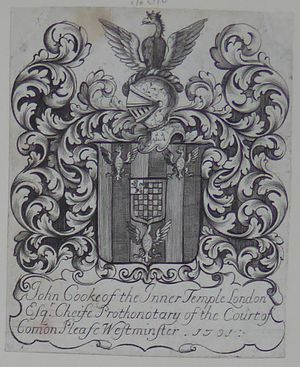Difference between revisions of "John Cooke d.1711"
From Book Owners Online
(Created page with "__NOTITLE__ ===name::John name::COOKE d.date of death::1711=== thumb|Cooke's bookplate (British Museum Franks Collection *315) ====Biograp...") |
|||
| Line 3: | Line 3: | ||
[[file:P1120448(3).JPG|thumb|Cooke's bookplate (British Museum Franks Collection *315)]] | [[file:P1120448(3).JPG|thumb|Cooke's bookplate (British Museum Franks Collection *315)]] | ||
====Biographical Note==== | ====Biographical Note==== | ||
| − | [[occupation::barrister|Barrister]] of the [[organisations::Inner Temple]], and [[occupation::Chief Prothonotary]] of the [[organisations::Court of Common Pleas]]. His background and education have not been traced, but he may have lived at [[location::Cranbrook, Kent]]; his arms were granted in 1679. One of his sons, [[crossreference::George Cooke 1675-1740|George]] later held the same office as Prothonotary. | + | [[occupation::barrister|Barrister]] of the [[organisations::Inner Temple]], and [[occupation::Chief Prothonotary]] of the [[organisations::Court of Common Pleas]]. His background and education have not been traced, but he may have lived at [[location::Cranbrook, Kent]]; his arms were granted in 1679. One of his sons, [[crossreference::George Cooke 1675-1740|George]], later held the same office as Chief Prothonotary. |
====Books==== | ====Books==== | ||
Latest revision as of 07:16, 3 May 2021
John COOKE d.1711
Biographical Note
Barrister of the Inner Temple, and Chief Prothonotary of the Court of Common Pleas. His background and education have not been traced, but he may have lived at Cranbrook, Kent; his arms were granted in 1679. One of his sons, George, later held the same office as Chief Prothonotary.
Books
Cooke used and engraved armorial bookplate, dated 1701 (Franks 6714/*315). The extent of his library is not known; in his will, his books in his study in Lincolns Inn were bequeathed to his eldest surviving son, John.
Sources
- Will of John Cooke, The National Archives PROB 11/521/210.
- Grant of arms to John Cooke, J. J. Howard, Miscellanea genealogica et heraldica, 2nd ser vol. IV, 1892.
- Gambier Howe, E. R. J. Franks bequest: catalogue of British and American book plates bequeathed to the ... British Museum. London, 1903-4.
